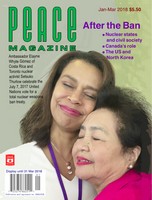
Peace Magazine Jan-Mar 2018, page 2. Some rights reserved.
Search for other articles by peacemag here
Vladimir Putin has presided over a ceremony showing on television the elimination of Russia’s last declared chemical weapons. The Organization for the Prohibition of Chemical Weapons presented a certificate to that country on November 10, 2017, marking the full destruction of the 39,967 metric tons of Russian chemical weapons.
According to the Chemical Weapons Convention, which the US and Russia signed in 1993, initially they were both supposed to destroy their stockpiles by 2007, but as that deadline approached, neither country was on schedule, so the date was extended to 2012. Russia later set 2020 for its own deadline, while the US now expects to reach the goal by the end of 2023.
Sources: New York Times, Sept 27, 2017 and OPCW.
Jeremy Corbyn, the British Labour Party leader, received the Sean MacBride Peace Prize, along with Noam Chomsky and an organization of Japanese activists opposing a military base. The award was conferred in Geneva on December 9. 2017 by the International Peace Bureau to Corbyn, Chomsky, and the All Okinawa Council Against Henoko New Base.
IPB honoured Corbyn for his longtime work with the Campaign for Nuclear Disarmament. However, the British press barely mentioned Corbyn’s award.
Source: RT, Dec. 10, 2017
On November 16, 2017 at the United Nations Security Council, Russia vetoed a resolution to extend the life of a panel investigating who is using chemical weapons in the Syrian war.
The panel has found that chemical poisons have been used by both the Syrian government’s military and the Islamic State. Eleven of the 15 members of the Security Council voted in favor of the the US-led resolution to extend the panel’s mandate but Russia and Bolivia opposed it and China and Egypt abstained.
Russia had required methodological changes in the panel’s work, for it had disliked its report, which found the Syrian military responsible for a sarin attack in northern Syria. The US and other member States had defended the panel’s methods and accused Russia of trying to neuter its ability to identify who is behind the chemical weapons attacks.
With the termination of the investigation, it probably will never be known who perpetrated all the chemical attacks in Syria.
Source: Rick Gladstone in New York Times, Nov. 16, 2017.
On November 15, 2017 Democratic Rep. Adam Smith of Washington introduced a bill to Congress making it US policy not to use nuclear weapons first. Calling them “instruments of deterrence,” he said that a “declaratory policy of not using nuclear weapons first will increase strategic stability, particularly in a crisis, reducing the risk of miscalculation that could lead to an unintended all-out nuclear war.”
While Smith’s bill falls short of calling for abolition of the weapons in accordance with the Treaty on the Prohibition of Nuclear Weapons (TPNW), peace activists would welcome its passage for the same reasons that Smith had adduced.
Source: John Hallam, Google Nuclear News List Group.
NATO’s Nuclear Planning Group met in November to hear remarks from US Secretary of Defense James Mattis. He showed intelligence evidence that Russia is secretly deploying nuclear-armed medium-range ballistic missiles.
With its satellite imagery, the US believes it can prove that Moscow has a new ground-launched, nuclear-capable cruise missile, the SSC-8, which would violate the INF Treaty that Reagan and Gorbachev signed 30 years ago.
Mattis told the top-secret meeting in Brussels that NATO must find a common position on forcing the Russians to return to compliance with the INF Treaty, with coercion if necessary. One option calls for the US to develop new medium range missiles itself.
Source: Spiegel Online, Dec. 8, 2017, reporting article by Matthias Gebauer, Christoph Schult and Klaus Wiegrefe
Murray Thomson’s Good News Service reports on some cheerful facts from the astronaut Chris Hadfield:

Peace Magazine Jan-Mar 2018, page 2. Some rights reserved.
Search for other articles by peacemag here